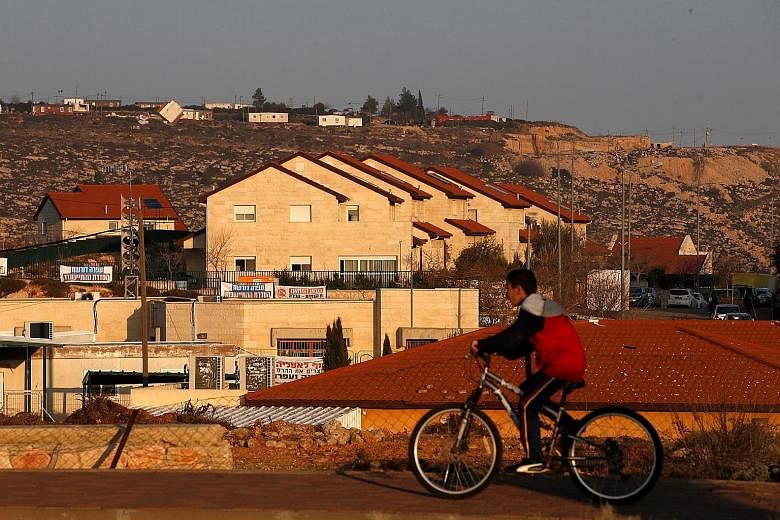JERUSALEM • Israel has passed a law retroactively legalising about 4,000 settler homes built on privately owned Palestinian land in the occupied West Bank, a measure that has drawn international concern.
The legislation has been condemned by Palestinians as a blow to their hopes of statehood.
But its passage on Monday may be largely symbolic, as it contravenes Israeli Supreme Court rulings on property rights, with the Attorney-General warning that he will not defend it at the Supreme Court.
Though the legislation, passed by a vote of 60 to 52, was backed by Israeli Prime Minister Benjamin Netanyahu's right-wing coalition, it has raised tensions in the government.
A White House official said given that the new law is expected to face challenges in Israeli courts, the Trump administration "will withhold comment on the legislation until the relevant court ruling".
Political sources have said Mr Netanyahu privately opposes the Bill over concerns that it could provide grounds for prosecution by the International Criminal Court in The Hague.
The White House official, speaking anonymously, said Washington would oppose any such international legal action.
But the far-right Jewish Home party, a member of the coalition looking to draw voters from the traditional base of Mr Netanyahu's Likud, pushed for the legislation after the forced evacuation of 330 settlers last week from an outpost built on private Palestinian land.
With Mr Netanyahu under police investigation on suspicion of abuse of office, an allegation he denies, Likud has been slipping in opinion polls. Opposing the law would have risked alienating his supporters and ceding ground to Jewish Home.
Last-minute appeals by Mr Netanyahu to postpone the vote until after he meets US President Donald Trump in Washington next Wednesday were refused by Jewish Home, political sources said.
Ms Hanan Ashrawi, a senior member of the Palestine Liberation Organisation, the main Palestinian political umbrella body, said in a statement that the law gave settlers a green light to "embark on a land grab".
"Prime Minister Benjamin Netanyahu and his extremist, racist coalition government are deliberately breaking the law and destroying the very foundations of the two-state solution and the chances for peace and stability," Ms Ashrawi said.
The United Nations Special Coordinator for the Middle East Peace Process Nickolay Mladenov said in a statement that the law "will have far-reaching legal consequences for Israel and greatly diminish the prospects for Arab-Israeli peace".
However, Mr Netanyahu may face little to no criticism from the White House, which has signalled a far softer approach to the settlement issue than that of the Obama administration.
REUTERS

